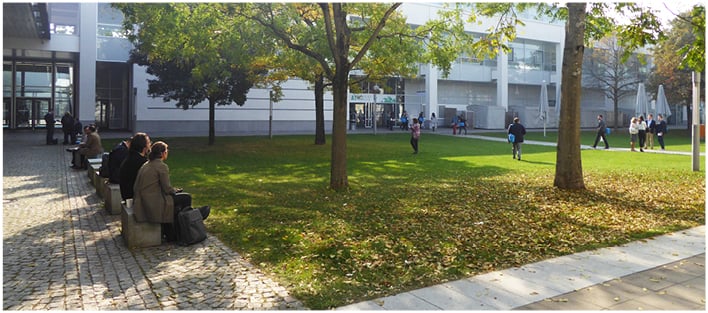Summary of the ESMO 2018 Presidential Symposia
During this year’s ESMO Congress, the EMJ team attended the three hotly- anticipated Presidential Symposia chaired by ESMO President Prof Josep Tabernero. Here, we bring you our own summary of the groundbreaking findings presented during these sessions, encompassing late-breaking data from studies of advanced cancer subtypes, such as breast, prostate, ovarian, and oropharyngeal cancer.
Presidential Symposium 1
Saturday 20th October 2018
Assisted by co-chair Prof Andrés Cervantes, Prof Tabernero announced the opening of ESMO 2018’s first Presidential Symposium, which began with a discussion of the practice-changing data from the IMpassion130 trial,1 the first positive Phase III study of first-line immunotherapy treatment for metastatic triple-negative breast cancer (TNBC). This randomised, double-blind trial investigated atezolizumab in combination with nab-paclitaxel versus placebo with nab-paclitaxel in 902 treatment-naïve TNBC patients, a patient subset that commonly experiences poor outcomes compared to patients with other breast cancer subtypes. With known efficacy in multiple cancers, the anti-programmed death ligand-1 (PD-L1) antibody atezolizumab with the addition of chemotherapy to enhance anti-tumour activity showed a statistically significant progression-free survival (PFS) benefit and improved overall survival (OS) in a PD-L1+ TNBC population. No negative effects were observed in the PD-L1- population and the combination treatment was well tolerated, establishing atezolizumab with nab-paclitaxel as a new standard of care for this difficult-to-treat patient population. “Impassion130 brings breast cancer into the immunotherapy arena,” concluded discussant Prof Giuseppe Curigliano, European Institute of Oncology, Milan, Italy. Turn to the Congress Review section for a more detailed discussion of these results.
With breast cancer being the leading cause of cancer-related death in women,2 the three remaining studies of this session focussed on advanced breast cancer patients, who represent a population in need of new, more effective treatments. The first of the studies presented during this session, and also summarised in the Congress Review section, was the first mature OS analysis from the PALOMA-3 Phase II study,3 which investigated cyclin dependent kinases (CDK)4/6 inhibitor palbociclib in combination with fulvestrant for women with HR+ HER2– advanced breast cancer. By performing an OS analysis in 521 randomised patients with a median follow-up of 44.8 months, a clinically meaningful improvement in OS was shown with the combination treatment, while the difference in PFS gain was also maintained. With such positive results for this patient population, a discussion around the guidelines for the treatment of advanced breast cancer patients was noted as necessary, and discussants suggested that a meta-analysis of all CDK4/6 inhibitor trials is warranted to investigate their efficacy in this cancer subtype.
Supplementing these results was the presentation of the SOLAR-1 study,4 which is the first study of precision medicine in metastatic breast cancer. After positive preliminary evidence of clinical activity of PI3K inhibitor alpelisib in combination with fulvestrant, this Phase III, randomised, controlled trial demonstrated a significant PFS benefit with alpelisib compared to placebo in 341 HR+ HER2– PIK3CA+ advanced breast cancer patients. Additionally, the tolerability profile of the alpelisib-fulvestrant combination was good and the majority of adverse events were of severity Grade 1/2, including hyperglycaemia, diarrhoea, and rash. The final investigation presented during the Saturday session involved post-menopausal HR+ HER2– advanced breast cancer patients who were treated with a histone deacetylase inhibitor in combination with an endocrine blockade.5 Patients who received chidamide, currently approved for peripheral T cell lymphoma, with exemestane had a significant improvement in PFS versus the placebo group (7.4 months versus 3.8 months; hazard ratio: 0.755). With manageable adverse effects, most commonly haematological, chidamide is the first oral histone deacetylase to show such positive effects when combined with an aromatase inhibitor in HR+ breast cancer, and these findings will prompt further research into this method of targeting malignant breast tissue.
Commenting on the implications of the novel data revealed during the first Presidential Symposium, Prof Curigliano stated: “These studies are providing us with the answers we need to more effectively treat the advanced stages of the disease across subtypes.”

Presidential Symposium 2
Sunday 21st October 2018
During his second Presidential Symposia of ESMO 2018, Prof Tabernero, joined by co-chair Prof Fortunato Ciardiello, welcomed attendees to the reveal yet more promising data from recent oncology trials, including new insights into the management of prostate cancer. Presented by Mr Alex Hoyle, the first trial of this session explored the hypothesis that low-risk metastatic hormone-sensitive prostate cancer patients benefit from combined treatment of abiraterone acetate, prednisolone, and androgen deprivation therapy (ADT). Retrospective stratification of patients from the ongoing multi-arm randomised controlled STAMPEDE trial,6 which assessed novel approaches for the treatment of men with prostate cancer who are starting long-term ADT for the first time, was performed, classifying patients into high or low-risk or volume metastatic disease. The results showed that the combination therapy improved all survival endpoints, highlighting the applicability of this treatment strategy for all metastatic hormone-sensitive prostate cancer patients regardless of their risk and/or volume classification. Supplementing these findings were more data from the STAMPEDE trial, this time focussing on the role of radiotherapy for patients with newly diagnosed metastatic disease.7 Compared to standard care alone (lifelong ADT) and with no association with the extent of metastases, radiotherapy plus standard care improved failure-free survival (Hazard ratio: 0.68; 95% confidence interval [CI]: 068–0.84) in a comparison involving 2,061 patients. The researchers also noted an improvement in OS of patients with oligometastatic disease, supporting the role for localised radiotherapy in newly diagnosed metastatic prostate cancer patients with a low metastatic burden.
Reflecting on the ever-increasing role of immunotherapy in shifting the focus of cancer treatments, the next late-breaking trial revealed to the audience was the Phase III JAVELIN Renal 101 trial,8 a randomised trial of combined axitinib and avelumab for advanced renal cell carcinoma. Out of a total of 886 kidney cancer patients, 442 were administered the immune checkpoint blocker avelumab in combination with axitinib, while 444 patients received sunitinib. Results of the trial showed significant improvements in PFS in the combination arm compared to the sunitinib arm (13.8 months versus 8.4 months), irrespective of the patient PD-L1 expression, as well as higher overall response rates (55.2 versus 25.5). As the first results to show positive outcomes from combining an immune checkpoint blocker with a tyrosine kinase inhibitor for the treatment of advanced renal cell carcinoma, this combination therapy may have potential to improve the poor outlook for these patients.
The Sunday session drew to a close with the final presentation, evaluating the use of a PARP inhibitor as maintenance therapy after first-line chemotherapy in ovarian cancer patients. The SOLO1 trial9 is a Phase II trial investigating olaparib treatment in 391 newly diagnosed BRCA-mutated patients with advanced ovarian cancer. After follow-up of 41 months, a statistically significant and clinically meaningful improvement in PFS was shown compared to placebo, meeting the study’s primary endpoint: olaparib reduced the risk of progression or death by 70% compared to placebo. Currently approved as a maintenance therapy for platinum-sensitive relapsed ovarian cancer patients and for BRCA-mutated patients after ≥3 prior lines of chemotherapy, these unprecedented results suggest earlier use of olaparib may be beneficial in select ovarian cancer patients, with few concerns of adverse effects or changes in health-related quality of life. More details of the JAVELIN Renal 101 trial and the SOLO1 trial are available within the Congress Review section.

Presidential Symposium 3
Monday 22nd October 2018
During his final Presidential Symposia of ESMO 2018, Prof Tabernero was joined by Prof Solange Peters, ESMO Scientific Committee Chair, to chair discussions around the remaining three late-breaking trials to be revealed at the event. Continuing the theme of improving the management of advanced-stage cancers, results from the KEYNOTE-048 study10 were described. The open-label, randomised Phase III study investigated first-line pembrolizumab for patients with recurrent or metastatic head and neck squamous cell carcinoma (HNSCC). After randomisation of 882 patients to 200 mg pembrolizumab, pembrolizumab plus chemotherapy, or the standard EXTREME regimen, OS was significantly improved for certain patients. Specifically, OS increased in the PD-L1 combined positive score ≥20 and ≥1 populations after treatment with pembrolizumab compared to EXTREME regimen, while when chemotherapy was added, OS improved in the total population. These novel results support the use of the immune checkpoint inhibitor pembrolizumab and pembrolizumab plus chemotherapy as first-line standards of care for recurrent or metastatic HNSCC patients who are not curable by local therapy.
Next were new insights into the treatment of patients with human papilloma virus (HPV)-positive throat cancer, who are now believed to benefit more from chemoradiotherapy than cetuximab with radiotherapy. Results from this late-breaking trial, which compared side effects and survival outcomes of these two treatments in 334 HPV-positive throat cancer patients, showed that cisplatin was associated with significantly higher 2-year OS rates (97.5%) compared with cetuximab (89.4%).11 Cancer recurrence rates were also lower in patients treated with cisplatin (16.1% versus 6.0%) and there were no differences in the total number of side effects or toxic events. The researchers concluded that the combination of cisplatin and radiotherapy gives a great benefit in terms of survival in these select patients and, therefore, should be the first treatment option considered. The next steps will involve genotyping patients to determine who will benefit most from this treatment.
Drawing the 2018 Presidential Symposia to a close was the ALESIA trial,12 a randomised, multicentre, Phase III open-label study of alectinib versus crizotinib in Asian patients with treatment-naïve anaplastic lymphoma kinase-positive advanced non-small-cell lung cancer (NSCLC). The investigation recruited 187 participants from 21 sites and randomised them to receive 250 mg crizotinib twice daily or 600 mg alectinib twice daily. After approximately 15 months follow-up, investigator-assessed median PFS was 11.1 months in the crizotinib group but unreached in the alectinib group, remaining consistent when adjusted for age, sex, and smoking status. Additionally, with a more promising safety profile compared to crizotinib (adverse events occurring in 28.8% and 48.8%, respectively), the researchers concluded that ALESIA confirmed the systemic and intracranial efficacy of alectinib over crizotinib for the treatment of anaplastic lymphoma kinase-positive advanced NSCLC Asian patients, consistent with results of the global ALEX study.13
From attending these sessions and learning more about the very latest and ongoing research of advanced cancer therapeutics, it is clear that oncology remains as fast-paced as ever. With new insights revealed every day, patient care will continue to be enhanced, leading to better outcomes and prognosis for many. We are sure you will join us in eagerly awaiting the presentation of exciting new results from the coming year at the ESMO 2019 Congress in Barcelona, Spain, moving us one step closer to achieving guaranteed remission of cancer.








